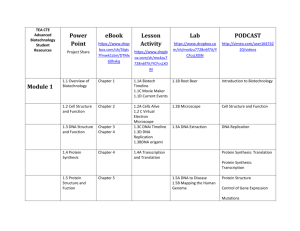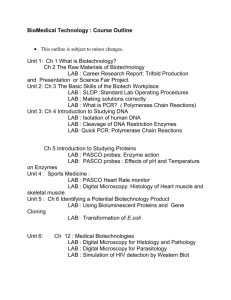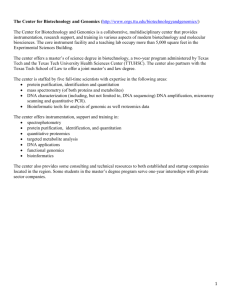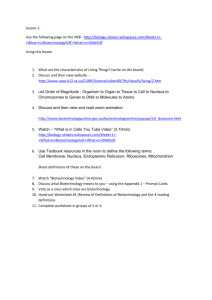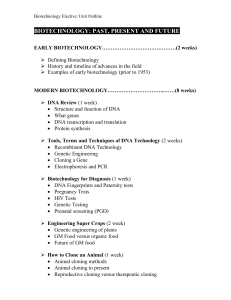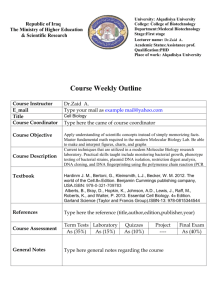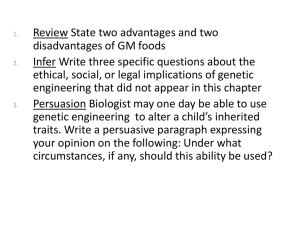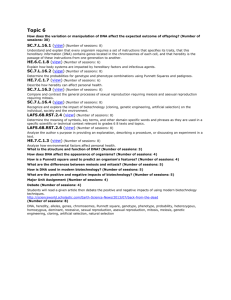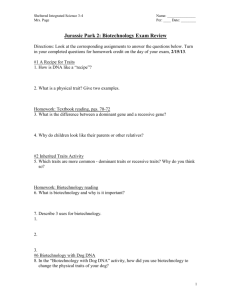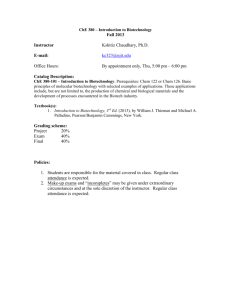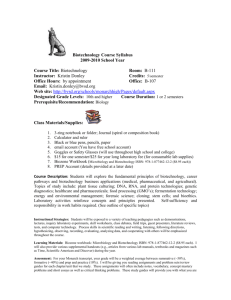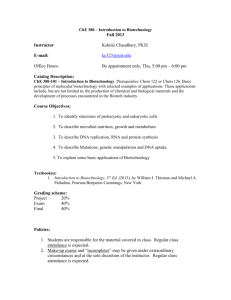biotech syllabus 2011-2012
advertisement
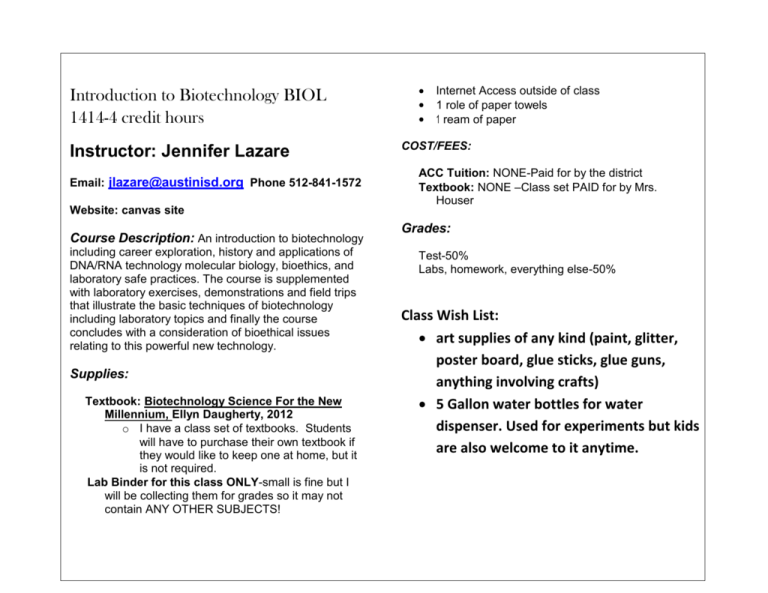
Introduction to Biotechnology BIOL 1414-4 credit hours Instructor: Jennifer Lazare Email: jlazare@austinisd.org Phone 512-841-1572 Website: canvas site Course Description: An introduction to biotechnology including career exploration, history and applications of DNA/RNA technology molecular biology, bioethics, and laboratory safe practices. The course is supplemented with laboratory exercises, demonstrations and field trips that illustrate the basic techniques of biotechnology including laboratory topics and finally the course concludes with a consideration of bioethical issues relating to this powerful new technology. Supplies: Textbook: Biotechnology Science For the New Millennium, Ellyn Daugherty, 2012 o I have a class set of textbooks. Students will have to purchase their own textbook if they would like to keep one at home, but it is not required. Lab Binder for this class ONLY-small is fine but I will be collecting them for grades so it may not contain ANY OTHER SUBJECTS! Internet Access outside of class 1 role of paper towels 1 ream of paper COST/FEES: ACC Tuition: NONE-Paid for by the district Textbook: NONE –Class set PAID for by Mrs. Houser Grades: Test-50% Labs, homework, everything else-50% Class Wish List: art supplies of any kind (paint, glitter, poster board, glue sticks, glue guns, anything involving crafts) 5 Gallon water bottles for water dispenser. Used for experiments but kids are also welcome to it anytime. Enrollment: Everyone will receive a 4th year Science CreditHonors You may also enroll in this course for DUAL CREDIT (college and high school credit) I will help you enroll in Early College Start in the Fall and BIOL 1414 in in the Spring BIOL 1415 will be offered in Summer of 2015 CLASS RULES: *Don’t be upset by the results you get from the work you didn’t do. *If it’s important to you, you will make it happen. If not, you will make excuses. Consequences: Treat you like a high school freshman Class SetUp/Rational: This is a college workforce course that is career prep/student centered meaning you will do the information gathering, lab setups, lab execution and lab clean up. You will be able to create a resume with various lab skills upon completion of the course and be overqualified for a lab technician position. All test are open lab notebook and or project based which means they will not be easy, but you should do fine if you pay attention in class, record everything you observe or conclude and ask questions when you don’t understand. If you take care of business during class, homework should be rare with the exception of studying for test. TEA CTE Advanced Biotechnology Student Resources Module 1 Power Point eBook Project Share Lesson Activity Lab PODCAST 1.1 Overview of Biotechnology Chapter 1 1.1A Biotech Timeline 1.1C Movie Maker 1.1D Current Events 1.1B Root Beer Introduction to Biotechnology 1.2 Cell Structure and Function Chapter 2 1.2B Microscope Cell Structure and Function 1.3 DNA Structure and Function Chapter 3 Chapter 4 1.2A Cells Alive 1.2 C Virtual Electron Microscope 1.3C DNAi Timeline 1.3D DNA Replication 1.3BDNA origami 1.3A DNA Extraction DNA Replication 1.4 Protein Synthesis Chapter 4 1st/2nd 6 weeks 1.4A Transcription and Translation Protein Synthesis: Translation Protein Synthesis: Transcription 1.5 Protein Structure and Function Chapter 5 1.5A DNA to Disease 1.5B Mapping the Human Genome Protein Structure Control of Gene Expression Mutations 1.6 Math for the Scientist Chapter 6 1.6A Math Skills 1.6B Excel Tutorial 1.6C Making Solutions and Dilutions 1.7 Lab Basics Chapter 7 1.7B Keeping a Lab Notebook 1.7A Training Lab Tech: Safety 1.7C Micropipette 1.7D Calibrating Lab Equipment Using the Electric Balance Using the pH Meter Using the Micropipettor Using the Centrifuge Preparing an Agarose Gel Electrophoreis Module 2 2.1 Recombinant DNA Technology 2.1C DNA Sequencing 2.1D Making Recombinants 2.1A Dye Electrophoresis 2.1B Restriction Enzymes 2.2E GFP Transformation 2.2 DNA Analysis 2.2C PCR Web 2.2A PFLP Web 2.3 Therapeutic Proteins (column, SDS) 2.3A Module organisms 2.2C PCR 2.2B VNTR 2.2A RFLP 2.3C SDS GFP 2.3BColumn Chromatography 2.4 Bioinformatics 2.4A Bioinformatics: The Basics 2.4B Bioinformatics: Understanding Disease 3.1A History of Cloning 3.1B Cloning methods 3.1C Cloning in the Movies 3rd/4th 6 weeks Module 3 3.1 Cloning Methods 5th 6 weeks 3.2 Advancements in Animal BT *RNAi *SNPs 3.3 Plant Biotechnology Harvest of Fear 3.4 Environmental Biotechnology Module 4 4.1 Regenerative Medicine 6th 6 weeks 4.2 Molecular Diagnostics STEM CELL Module 3.2A Transgenics 3.2C RNAi 3.2B SNPs 3.3A Plant Tissue Culture 3.3B GMO Ethics 3.4A Bioremediation 4.1A Future in Biotech EXPLORAVISION Biogenius Challenger STEM CELLS 4.1B ELISA 4.1A Microarrays 4.3 Pharmaceuticals Epigenetics 4.3 A Careers in Biotech Extensions Explorasvision: http://www.exploravision.org Entries due late January DNA Day Essay: http://www.ashg.org/education/dnadaycontest.shtml Biogenius Challenge: http://www.biotechinstitute.org/go.cfm?do=Page.View&pid=2 Entries due mid March Citizen Science: https://www.zooniverse.org Citizen Science: http://www.scientificamerican.com/citizen-science/ Siemens Competition: http://www.siemens-foundation.org/en/competition.htm
